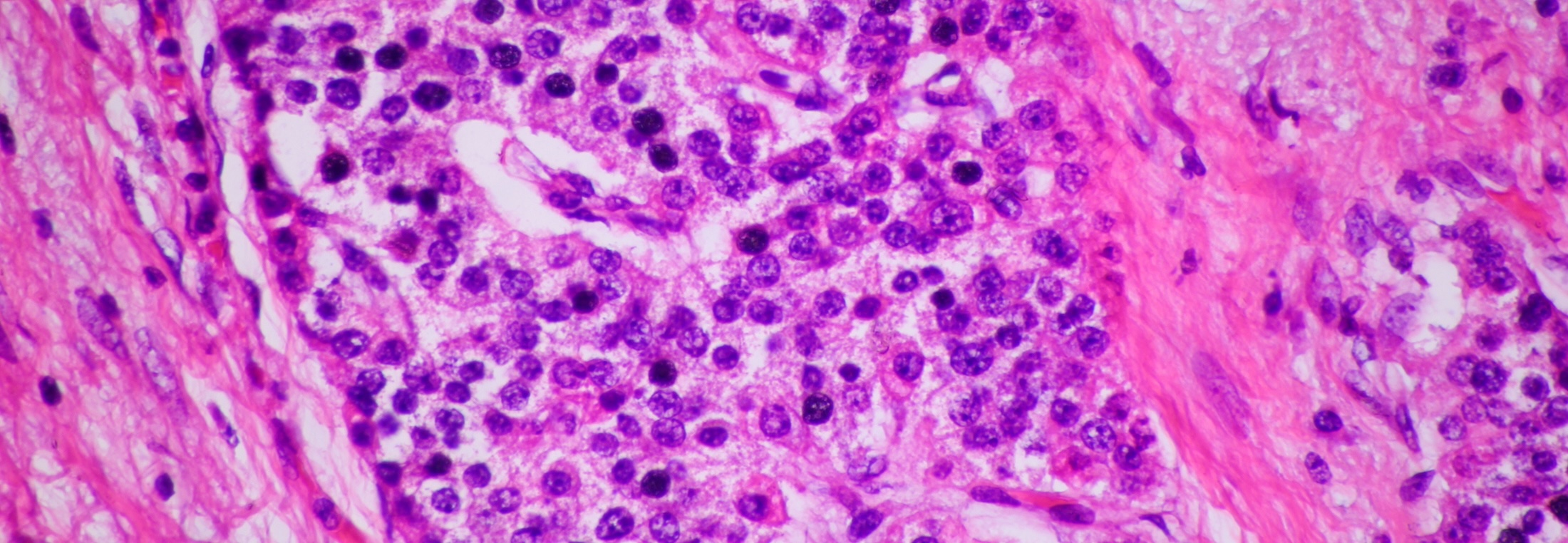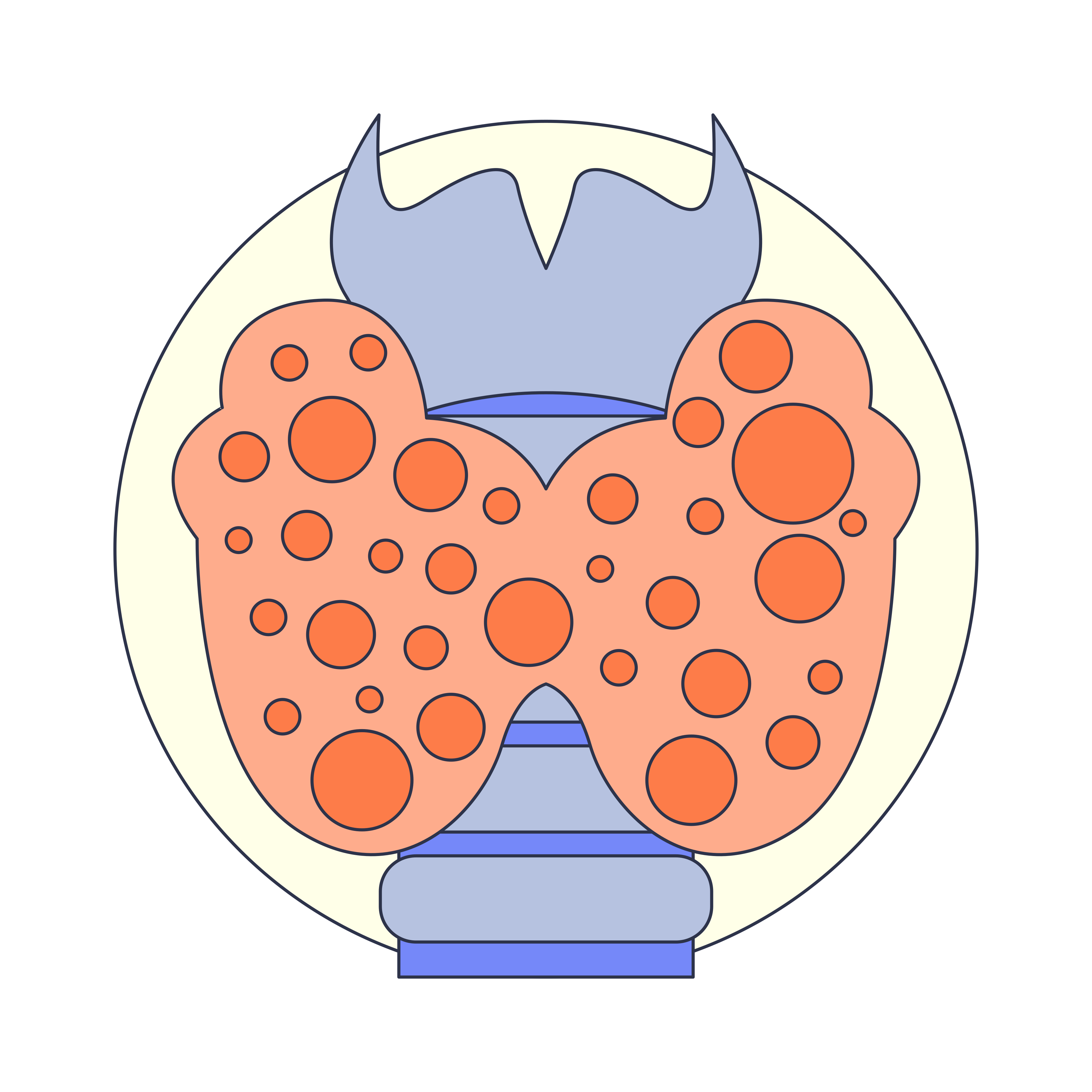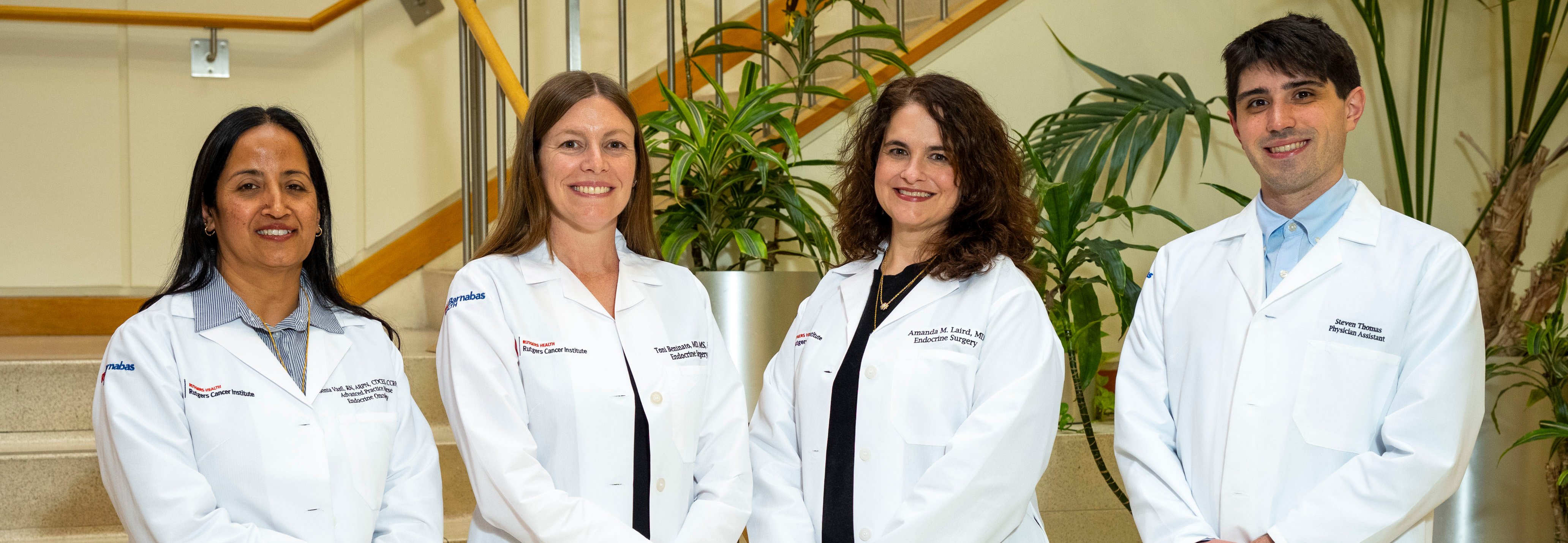
The Endocrine and Neuroendocrine Tumor Program offers a multidisciplinary, comprehensive approach for the full spectrum of treatment for these unique tumors.
Our team of endocrine surgeons, surgical oncologists, endocrinologists, medical oncologists, radiation oncologists, radiologists, advanced practice nurses, nurse navigators, social workers, and genetic counselors collaborate to ensure that each patient is cared for with an individualized approach.
To request an appointment, call 844-CANCERNJ | Find a Clinical Trial
What are Endocrine and Neuroendocrine Tumors?
Endocrine and neuroendocrine tumors develop from hormone-producing cells, affecting glands like the thyroid, pancreas, and adrenal glands. These tumors may be benign or malignant, varying in behavior and treatment needs. Risk factors include genetic conditions (e.g., multiple endocrine neoplasia types 1 and 2), family history, smoking, and environmental exposures, though early diagnosis and personalized care are always key to successful outcomes.
With years of experience, our experts specialize in the treatment of:
- Thyroid cancer, including medullary thyroid cancer
- Parathyroid tumors
- Adrenal tumors and hormone-producing adrenal tumors
- Pheochromocytoma and paraganglioma
- Adrenocortical cancer
- Pancreatic neuroendocrine tumors (PNETs)
- Carcinoid and neuroendocrine tumors throughout the body

The Latest Diagnostic and Treatment Options
Meet Our Team

Our providers meet weekly to coordinate patient care from diagnosis to treatment to follow-up, providing a close, collaborative approach between specialists. Our clinicians also work closely with our scientists on basic, clinical, and translational research activities in an effort to advance our understanding of these unique tumors. With a Designation of Focused Practice in Adult Complex Thyroid and Parathyroid Surgery from the American Board of Surgery, Dr. Laird and Dr. Beninato provide the most comprehensive, advanced treatment options available.
Articles and Press
RWJBarnabas Health and Rutgers Cancer Institute Surgeons Earn New National Designation in Complex Thyroid and Parathyroid Surgery
Amanda M. Laird, MD, FACS, and Toni Beninato, MD, MS, FACS, have received a Focused Practice Designation in Adult Complex Thyroid and Parathyroid Surgery from the American Board of Surgery. This newly established national certification recognizes high-volume endocrine surgeons with significant experience in advanced thyroid and parathyroid procedures.
A Minimally Invasive Solution for Benign Thyroid Nodules: Radiofrequency Ablation (RFA)
Recent advances in medical technology now allow experts to treat benign thyroid nodules using a minimally invasive, non-surgical treatment known as thyroid radiofrequency ablation (RFA).
Is Thyroid Cancer Common? And More Questions You Want Answered
Discover the importance of the thyroid, symptoms of concern, when to get screened for cancer and tips to maintain a healthy thyroid. Learn more.

Maintaining Thyroid Health
Discover various tips for maintaining and promoting thyroid health, as it is vital to the endocrine system and your body's metabolism. Learn more.

Thyroid Cancer: Small Gland, Big Impact
Explore the impact of thyroid cancer, recommendations for early detection, and the latest major treatment advances in the field. Learn more.
Frequently Asked Questions (FAQs)
How common are endocrine tumors?
Benign endocrine tumors, or nodules, of the thyroid, parathyroid, and adrenal glands become more common as we get older. As many as 50% of the population has a thyroid nodule and most of them are benign. Similarly, close to 10% of people may have an adrenal nodule which are also commonly benign. Cancers of the thyroid, parathyroid, and adrenal glands are less common. Evaluation by a dedicated endocrine team can help differentiate between these types of tumors.
How do you diagnose a neuroendocrine or endocrine tumor?
For thyroid and adrenal nodules, many are discovered incidentally on imaging studies done for another reason. Ultrasound is the best test for thyroid nodules, which will determine whether biopsy is necessary. Adrenal nodules are usually evaluated with a CT scan. In addition to imaging studies, blood tests will reveal whether thyroid, parathyroid, or adrenal tumors are hormonally active. A combination of blood tests and imaging studies along with biopsy, if appropriate, will help you and your doctor determine the best course of treatment for you, if necessary.
Can I prevent neuroendocrine and endocrine tumors?
No, most endocrine and neuroendocrine tumors occur sporadically, meaning that they occur without specific cause and are not inherited. Researchers don’t know what causes endocrine and neuroendocrine tumors in most patients. You can understand potential risk factors, for example, if you have an inherited condition such as multiple endocrine neoplasia (MEN).
Can neuroendocrine or endocrine tumors be cured?
This depends on the type of tumor. The best thing to do is to speak with your doctor and seek care with a doctor who is an expert in this area. There are benign and malignant (cancerous) endocrine and neuroendocrine, including tumors of the thyroid, parathyroid, adrenal glands, pancreas, and gastrointestinal tract. All require different treatments, and cure depends on the tumor type. Research shows that patients do better when treated by a multidisciplinary group of doctors. Our experienced team of surgeons, oncologists, endocrinologists, radiologists, and radiation oncologists work together to individualize patient care.















